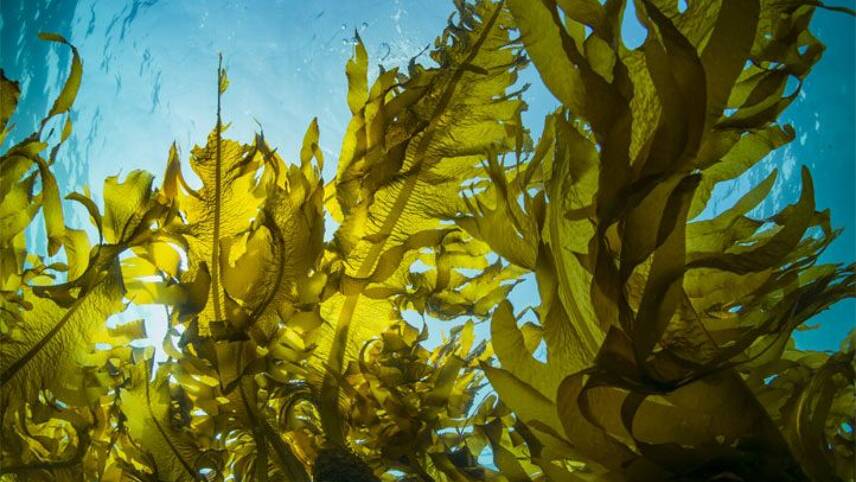Register for free and continue reading
Join our growing army of changemakers and get unlimited access to our premium content

95% of the kelp forest in the proposed project area has been lost since the 1980s
The plans have been proposed by Adur and Worthing Councils to the Crown Estate, which has the permission to lease the stretch of seabed identified as the project site. The Crown Estate as never leased a seabed for a natural capital project before; most bids are for offshore wind farms.
According to the councils, the 300 sq km stretch of seabed between Shoreham and Selsey Bill once played host to a dense kelp forest that provided a habitat for marine life – but that this habitat has undergone extensive damage since the 1980s, largely due to trawling. The councils state that 95% of kelp cover has been lost over the past four decades and that, if restored, it could capture carbon equivalent to the emissions of 7,235 UK homes.
In terms of biodiversity benefits, the councils expect that the project could support seahorses, lobsters, cuttlefish, bass, sole, black seabream and other species. They have also argued that there will be benefits in terms of reduced coastal erosion.
The councils have voted to contribute £50,000 of their own funding to help the development of the lease scheme. To attract external funding and, in the hopes of making the project processes run smoothly, they will launch a Sussex Bay Trust later in the year.
If the bid is successful, the Councils stated, there is a potential for them to work with other local authorities to extend the kelp cover to the entire Sussex coastline.
“This is a potentially game-changing project which would help us cut carbon emissions, restore beautiful marine and estuarine habitats and perhaps even to create Sussex Bay as a destination for a whole host of sustainable marine activities,” Worthing Borough Council’s executive member for digital and environmental services, Cllr Edward Crouch, said.
Valuing UK nature
Recent figures from the Office for National Statistics (ONS) revealed that the UK’s marine assets have reached a value of £211bn. But green groups believe this figure could be boosted with targeted nature restoration and habitat creation schemes, and that inaction could leave billions of pounds of assets at risk.
The UK is already playing host to a string of major saltmarsh and seagrass restoration schemes. What is believed to be the nation’s largest seagrass project is the result of a partnership between broadcaster Sky and WWF. WWF is also working with Carlsberg on a separate large-scale seagrass scheme. Aside from investment from end-user businesses, many financial firms are launching dedicated natural capital investment funds.
There are hopes that the UK Government could soon begin directly investing in UK natural capital projects at scale – especially in the wake of the landmark Dasgupta review on valuing biodiversity and following a pledge to allocate £3bn of international funding in this manner by 2026.
But Ministers are facing mounting pressure to ensure that their approach goes beyond improving pockets of land and marine habitats – both to get the nation back on track to deliver its pledge to leave nature better for the next generation, and to ensure that its long-term climate and nature goals are scientifically founded and are delivered.
Nature investment and jobs, major charities and trade bodies have been urging, could and should also play a major role in the UK’s economic recovery from Covid-19. Wildlife and Countryside Link has estimated that 25,000 jobs could be created in the nature sector, while Green Alliance puts the figure at 16,000. Both organisations recognise that job creation could benefit the areas facing the greatest employment challenges the most. The Treasury had been considering a new ‘National Nature Service’ for those made redundant amid Covid-19 but appears to have shelved the proposal.
Biodiversity and business resources
edie recently hosted a biodiversity-themed Masters series of exclusive content with the Woodland Trust, designed to inform, inspire and empower professionals to help develop leading nature projects and strategies for their organisations.
Access these resources below:
– Downloadable ‘edie Explains: Biodiversity and Business’ guide
– Sustainable Business Covered Podcast episode, also featuring Patagonia and Earth Security
– On-demand webinar, ‘Restoring Nature Through Your Sustainability Strategy’
Additionally, to mark the UN’s recent International Day of Biological Diversity, edie’s editorial team last month hosted an exclusive panel discussion with experts from Unilever, Thakeham Group, the ECIU and the Wildlife and Countryside Link. You can catch up with that recording here.
Sarah George


Please login or Register to leave a comment.